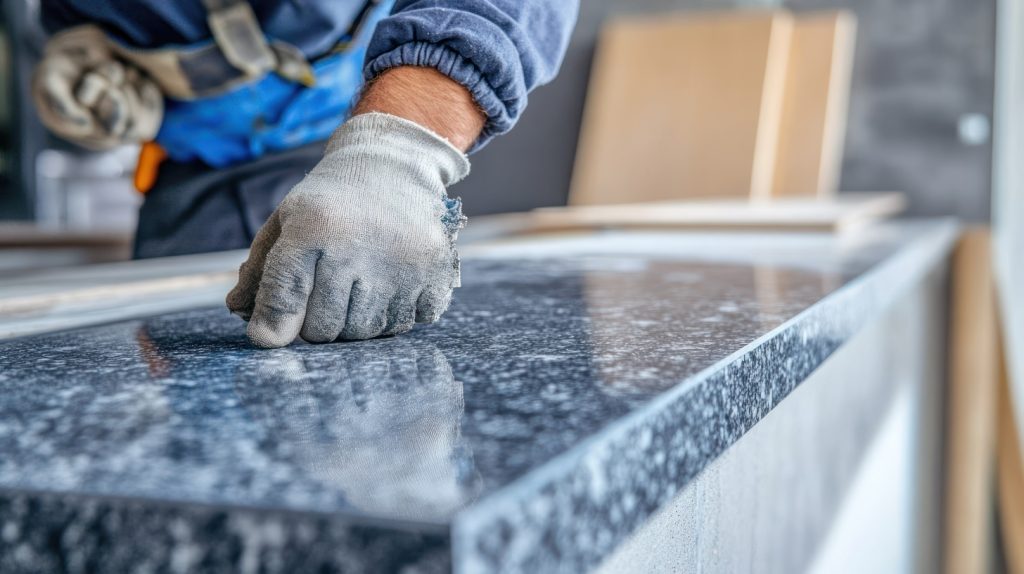
Worker installing new countertop in kitchen, closeup --ar 16:9 --v 6.1 Job ID: 71bf82ef-1196-4023-8c29-9eb395b9b508
DIY vs. Professional Countertop Installation: What’s Best?
When kitchen countertops become chipped, dated or damaged, replacement revitalizes the space with updated aesthetic appeal and restored functionality. The experts at Bedrock Quartz say that while installation seems straightforward, it actually requires expertise to achieve secure, seamless results. DIYers can potentially save on labor costs by tackling replacement projects themselves. Nevertheless, complex demolition, precise measurements, fussy preparations and tricky positioning often prove overwhelming without proper background. Learning the nuances of the trade takes copious time and mistakes jeopardize expensive materials. Many times, hiring a professional installer saves money, time and headaches while lending flawless results.
DIY Complexities
Ambitious homeowners might watch online tutorials making countertop installation appear deceivingly simple. However, successfully swapping out chunky granite slabs, glass sheets or quartz pieces is rarely easy even with elaborate rented equipment. Lifting massive materials requires several strong helpers to maneuver into place without slipping or cracking. One small measurement mistake results in obvious uneven seams or gaps ruining the clean uniform appearance of installed counters. Likewise, inadequate structural preparation causes shifting, cracking and early failure regardless of material quality. Meanwhile, demolishing old countertops demands proper safety protocols to contain hazardous debris. In most regions, rules even dictate special certified disposal methods for certain materials.
Professional Perks
By contrast, experienced countertop replacement contractors possess specialized equipment, allowing seamless installation not possible for DIYers. Powerful vacuum suction cups effortlessly hoist and align slabs perfectly every time. Pros own commercial grade saws and routers to artfully cut intrusions and holes for sinks and fixtures. Their mastery measuring and templating ensures pieces fit precisely with tight uniform seams even around corners or built-in appliances. Countertop specialists know the best practices to prepare substrates, correct uneven walls, and reinforce underlayments for completely secure trouble-free installation. Many fabricators also offer cabinet refacing to provide total coordinated kitchen transformations. Their familiarity with building codes and regulations facilitates required permits and compliant debris disposal.
Cost Analysis
Homeowners might presume professional installation is too costly but in reality, doing it yourself often accrues more expense long-term. Renting unwieldy machines proves pricey, not counting steep replacement fees for accidents and damage. Moreover, incorrectly measuring or installing counters necessitates expensive replacement and rework to remedy amateur errors. Demolition mistakes also commonly entail major structural repairs or full kitchen remodels. Factor in potential ER bills if injuries occur, hefting massive slabs overhead solo. Whereas a modest contractor up-charge guarantees flawless results from the start using professional techniques and equipment.
Evaluate the Scope
In very contained projects swapping out simple shapes on ample workspaces, DIY counters may suffice if homeowners possess sufficient stamina, coordination and carpentry expertise. But for larger kitchens with multiple disjointed levels, corners and cutouts, calling a contractor prevents problems. Tile, concrete, wood, and laminate counter materials allow slightly more DIY leeway than fragile stone or glass. Although amateur installation often leads to problems with paint-grade cabinets, such as gaps and unevenness at the seams. Know personal limits and carefully assess the specific complexities unique to your remodeling plans.
Conclusion
Updating tired kitchen countertops revitalizes both aesthetic appeals and functional workspace utility through any chosen material. Before tackling a replacement project solo, honestly assess your confidence measuring, cutting, lifting and positioning hefty materials precisely. Seek professional assistance if you lack specialized equipment or construction experience to avoid expensive fixes later. In rooms with tricky angles, multiple heights and cutouts, hiring a contractor often proves more affordable overall than repairing DIY damage. Evaluate kitchen scope, access to proper tools and personal capability to determine if installing new counters alone or using seasoned experts best fits your unique remodel.
